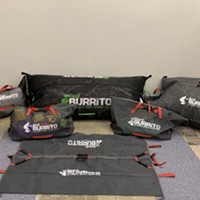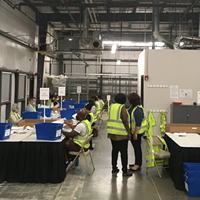Thursday, July 24, 2014
News / Politics Senate will likely approve sales-tax cap while House has a different plan
Posted By Jerry Klein on Thu, Jul 24, 2014 at 10:52 AM
The drama swirling around Mecklenburg County’s proposed sales-tax referendum only intensified Wednesday, as the state Senate voted 33-16 in favor of a second reading of a bill that would essentially kill the county’s plan to increase local teacher pay and provide some funding for the arts, among other projects. But that bill, which will most likely pass the Senate today, is now seen, I’m told, as DOA in the House.
That’s quite a reversal from what most expected just last week, as the opposition to that bill organized quickly, pitting the state’s urban counties, which vehemently argue in favor of their need to have the authority and flexibility to raise the tax, against the more rural counties, who are also competing for a slice of the state’s economic pie. What may be most interesting, though, about the way the process is unfolding is a reversal in the standard messages used by both parties to lay out their positions to the voting public.

To recap quickly: Mecklenburg County’s Board of Commissioners, led by Trevor Fuller, narrowly approved a referendum to go before the voters in November to increase the local sales tax by one-quarter of a percent. That mostly Democratic-backed initiative quickly spiked wide-spread controversy, even by some on the left, including Sen. Joel Ford, D-Mecklenburg, who criticized the process by which the commission had passed the measure (Ford argued it was done without the consent of all interested parties, including the state). Very soon afterwards, word began circulating that the General Assembly would make the referendum moot by an addition to a budget bill that would limit to 2.5 percent the total any one county can raise the sales tax — a cap that Mecklenburg has already hit, as have other counties such as Wake, whose leaders have complained loudly that the limit would hurt their efforts to improve transportation in their area, among other needs.
The Senate bill has been championed by Mecklenburg Republican Sen. Bob Rucho, who declared Wednesday, in attempting to justify his effort to kill the sales tax referendum, “What I can’t understand is how can anyone think that making it easier for some of the low-rung counties to take part in the economic growth of the state is wrong.”
As the Senate’s final approval appeared to be imminent by mid-week, House Democrats have adopted what is usually a Republican selling point in their argument against the measure: the need for government to remain both limited and as much in the hands of local representatives as possible, rather than having decisions made by a larger, far-away body. Mecklenburg’s Democratic Sen. Jeff Jackson took that line yesterday in voting against the bill, posting on his Facebook page, “Whether you think that’s a good idea or not (the sales-tax referendum), I argued on the Senate floor that Mecklenburg voters have a right to make the decision for themselves. We don’t need Raleigh centralizing control over our local democracy.”
And even Ford, who had originally been critical of the referendum and Chairman Fuller’s failure to consult with the state delegation, voted against yesterday’s Senate measure, posting this on his Facebook page: “I believe that the proper function of government is to do for the people those things that have to be done but cannot be done, or cannot be done well by individuals, and that the most effective government is government closest to the people.”
Meanwhile, efforts are underway to find some compromise, both on the sales-tax limitation and Mecklenburg’s referendum.
“It is very clear to me that some powerful interests are hard at work in Raleigh, in the Senate anyway, to use central planning and the power of the state to thwart the opportunity we worked so hard to give the people of Mecklenburg County to decide this issue locally,” Mecklenburg Democratic Commissioner Dwight Clarke told me yesterday. “And enough members of the majority party in the N.C. House may still think the right the people were given to decide this issue in a referendum is worth preserving. We are talking with some more sensible representatives of the people in the N.C. House about some compromises. We shall see if those talks bear any fruit.”
While the drama continues, those who stand to gain, or lose, the most — teachers and artists, to name a few — are left wondering, what’s next?
Speaking of...
Latest in The CLog
More by Jerry Klein
-

Ruling Obamacare unconstitutional will cost lives
Apr 8, 2015 -

Religious fanaticism threatens future of humanity
Mar 10, 2015 -

Thom Tillis' dumb take on regulations, more
Feb 11, 2015 - More »











